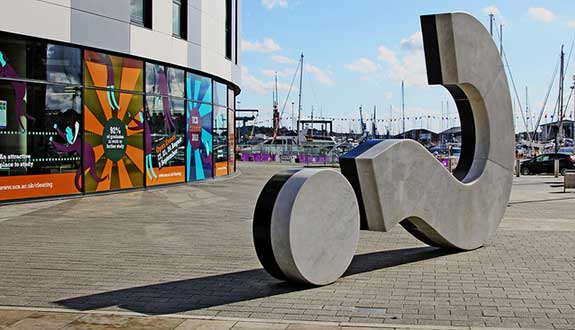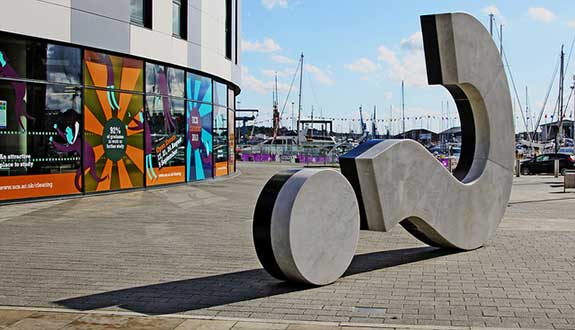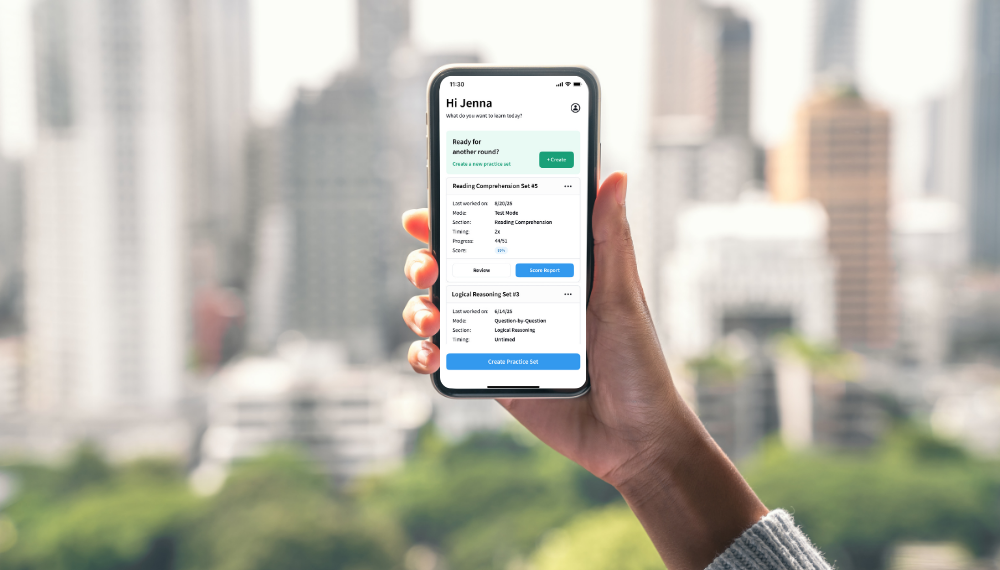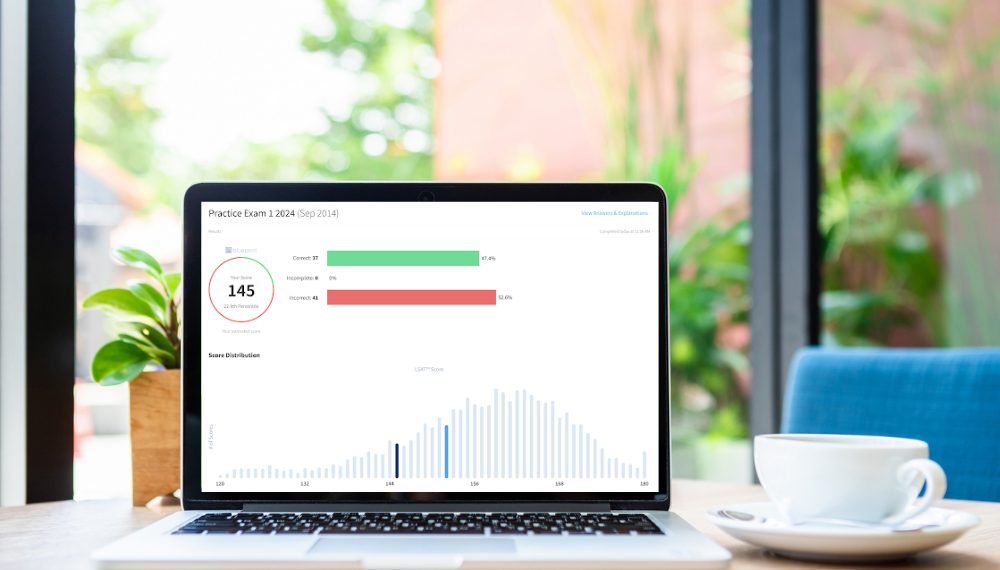
One of the cool things we’ve recently done at Blueprint is expand our online resources. Over the last year, we’ve instituted a live course — a full LSAT course we teach through biweekly webinars — and office hours — free daily hangout sessions where instructors go over LSAT concepts and field questions. So after mostly teaching in dusty old classrooms, our instructors are now online, baby.
Through these online platforms, our instructors get a broader sampling of the future attorneys of America than we did cordoned off in our in-person classrooms. Instead of just interacting with our classroom students, we get to hear from students self-studying with other materials. As a result, I’ve heard many questions about studying for the LSAT that I haven’t heard all that often when I was my classroom bubble.
One refrain I’ve heard a fair amount since this happened: “But doesn’t this answer choice require outside information?” Mostly in reference to Logical Reasoning and Reading Comp, I’ve heard many students express pause over picking an answer choice because they worry that picking that choice requires “outside information” — information not technically stated in the stimulus of an LR question or the RC passage.
Apparently, many people are getting the idea that “outside information = bad” on the LSAT. Or there’s some LSAT advice out there, somewhere, from some LSAT charlatans, that strongly cautions against relying on outside information.
So let’s take a moment to clarify this issue. When can you use outside information to support your answer on the LSAT? When can you not? And how should this affect your study plan?
When You Can Use Outside Information on the LSAT
Most of the LSAT, really. Many times, thinking about your experiences in the real world can help you predict what the right answer is. To pull back the curtain a little bit (to reveal the world’s most anticlimactic Wizard of Oz-situation) a lot of teaching the LSAT is simply providing real world analogies to help students connect the airy, abstract logical concepts on the LSAT to things they understand to be true in the real world. So, with a few exceptions (more on these below), it’s totally fine to refer to and think about outside information to support an answer choice. Sometimes, you kind of have to.
Here’s an example of an LR question that asks you to weaken the below argument:
“In the past, when there was no highway speed limit, the highway accident rate increased yearly, peaking a decade ago. At that time, the speed limit on the highway was set at 90 kilometers per hour (kph) (55 miles per hour). Every year since the introduction of the highway speed limit, the highway accident rate has been at least 15 percent lower than that of its peak rate. Thus, setting the highway speed limit at 90 kph (55 mph) has reduced the highway accident rate by at least 15 percent.”
OK, to recap: a (presumably Canadian) city set their highway speed limit at 90 kph (which the question helpfully reminds us — twice, for some reason — is about 55 miles per hour) and they saw a 15% drop in the highway accident rate. This person concludes that the speed limit is causing the lowered accident rate. By the way, that word “reduced” in the concluding sentence is where this person shows his cards, and reveals that he believes there’s a cause and effect relationship between the speed limit and accident rate.
Anyway, the right answer presents another reason why the accident rate might have decreased — as the right answers to questions that ask you to weaken a cause and effect relationship so often will. The right answer says, “Thanks to changes in automobile design in the past ten years, drivers are better able to maintain control of their cars in dangerous situations.” After giving some thought to the matter, few would disagree that this weakens the causal claim in the above argument. Rather than the speed limit forcing everyone to slow down and drive safely, cars are just inherently safer now, and less prone to getting into accidents. So that, not the speed limit, could be reason why the accident rate has fallen.
But doesn’t picking that answer choice require knowing a whole lot of outside information? I mean, the text of the argument didn’t even tell you that automobiles drive on highways! So to pick that answer choice you have to know that (1) there’s this invention called the “automobile”; (2) those things drive on highways; (2) people drive those automobiles; (3) not all automobiles are equally safe; (4) these highways at least occasionally present dangerous situations that could result in an accident … and probably a bunch of other things I’m overlooking. But again, few would deny that this answer choice nonetheless weakens the argument. Relying on outside information is OK!
After all, these questions are written by real people, who often reference real world studies, historical events, scholarly debates, and hot-button issues. As much as it can sometimes feel like spiteful logic demons (who happen to be resolutely anti-you going to law school) write these questions, they’re actually written by people who live in the same world as you and I. Plus, to be digestible, these questions have to be abbreviated at least somewhat. It’s not like every LR question is going to give you the abridged history of the automobile — so they’re going to occasionally require you to fill in some gaps with outside information.
Some questions really lend themselves to thinking outside information — Resolve, Explain, Strengthen, Weaken, and Flaw questions are typically made easier with references to outside information. A lot of questions don’t really lend themselves to outside info. These include questions that ask you to describe something in the argument — like its main point or argumentative strategy — or to look for a similar structure in the answer choices. But still, relying on outside information in any of these questions is technically OK.
When You Can’t Use Outside Information on the LSAT
There are some situations in which you can’t use outside information to support your answer, though. Namely: you can’t use outside information to support your answer choice on questions that require you to make a deduction. In Logical Reasoning, the Blueprint curriculum refers to these questions types as “Implication” questions. Those include questions that ask you to make a deduction that must be true, or a deduction that must be false, or a deduction that is “most strongly supported” by the stimulus. These types questions also show up Reading Comprehension, as well. Typically, the question will say something like “according to the passage” or “the passage states” or “the passage suggests.”
On those questions, we have to use the facts provided in the LR stimulus or RC passage, and only those facts. We can’t reference outside information. In fact, if an answer choice brings up any concepts that the stimulus or passage didn’t reference, it’s wrong. Even if we know, for whatever reason, that the surface of the Mars is less subject to erosion than the surface of the Earth, we can’t select an answer choice that claims that unless the stimulus or the passage talks about erosion on Mars and Earth.
Do You Have to Change Your Study Plan?
So does all this mean that you should switch up your study plan? That, in addition to a healthy diet of LSAT questions, you should add marathon Wikipedia-ingestion sessions to your study plan, to try to absorb as many helpful facts as you can?
No, definitely not. You shouldn’t bother trying to learn stuff for the LSAT. Most of all because you have literally no idea what weird topics it’s going to bring up. Also, when the LSAT does cut corners and requires you to use some outside information, it’s going to do so on topics pretty much everyone is familiar with — cars exist and drive on highways; the days of the week go Monday, then Tuesday, and so on; pollution could lead to environmental and health problems … that kind of stuff. Stuff you don’t have to study for.
(The one exception to that advice? Law stuff! They tried to make a law school entrance exam that didn’t require you to have any background information on the law, and yet that’s the one topic I’m telling you to brush up on. Go figure. Anyway, you are all-but-guaranteed to get a passage about some legal topic, and while you don’t technically have to know anything about the law to do well on those, it can help. These passages sometimes use insider-y legal jargon — referring to a judge as “the bench,” for instance — so it can help to have at least passing familiarity with legal concepts. Here are a couple primers to review that.)
A general piece of advice on outside information then? Don’t worry about it. Don’t worry about having to bring outside knowledge to the LSAT. Definitely don’t worry about having to acquire outside information for the LSAT. But also, outside of those questions that require you to make a deduction, don’t worry about having to rely on the occasional outside fact to support your answer, especially if that fact is well-understood and widely known. Mostly, just focus on applying sound strategic approaches and logical concepts to these questions.




